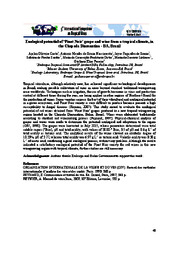Enological potential of 'Pinot Noir' grape and wine from a tropical climate, in the Chapada Diamantina - BA, Brazil.
Enological potential of 'Pinot Noir' grape and wine from a tropical climate, in the Chapada Diamantina - BA, Brazil.
Summary: Tropical viticulture, although relatively new, has achieved significant technological developments in Brazil, making possible cultivation of vines in areas beyond standard traditional winegrowing areas worldwide. Techniques such as irrigation, the use of growth hormones in vines and production control at different times during the year, are being applied in other regions of Northeast Brazil for the production of wines. Some varieties express the best of their viticultural and enological potential in a given ecosystem, and Pinot Noir variety is very difficult to produce because presents a high susceptibility to fungal diseases (Reynier, 2007).
Publication year: 2016
Types of publication: Abstract in annals or event proceedings
Unit: Embrapa Grape & Wine
Observation
Some of Embrapa's publications are published as ePub files. To read them, use or download one of the following free software options to your computer or mobile device. Android: Google Play Books; IOS: iBooks; Windows and Linux: Calibre.
Access other publications
Access the Agricultural Research Database (BDPA) to consult Embrapa's full library collection and records.
Visit Embrapa Bookstore to purchase books and other publications sold by Embrapa.

